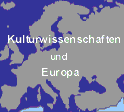
 |
Cultural Studies, Cultural Exchange, Europe |
|
As a result of the current transformation of social structures (from an agrarian-industrial society to an information-knowledge society), the significance of culture for the production of goods, the growing sector of cultural industries, and the increasing role of tourism (which can be viewed as a gigantic cultural process), culture could become one of the decisive factors of the 21st century. (1)
However, the significance of culture to society will also be determined by what role the Arts can play. It can certainly be expected that the Arts will contribute decisively to the formation of a humane civil society. Its forms of production are "sui generis", or to put it another way: the creation of a poem, its dissemination and reception are not analogous to the manufacture, sale and uses, for example, of an earthenware pot.
If one attempts to cultivate dialogue to avoid violent conflicts, then one might consider whether cultural studies should be declared the productive force of the 21st century.
Such a perspective must include much that appeals to the European politician, in that - instead of pursuing crisis management - diversity can be productively harnessed. The prerequisite is that diversity only not simply be tolerated, but that it be used instead as the basis for the reformation of society. Or to express the same thought in its negative sense: the development of one's culture shouldn't be hampered by a nationalistic programme. In this sense, limiting perspectives on development to multi- or interculturality is not only inadequate, but also conceals fundamental problems. At the very best proceeding in such a manner can lead to an unstable compromise between competing interests. Only intensive investment in regional and transcultural processes (in particular their interactive elements and with the vigorous participation of cultural studies) can deal equitably with the needs of today, which are dominated by an ever more tightly knit complex of economic, communications technology, travel technology, political, social, artistic, and scientific factors operative worldwide.
Subject oriented cultural studies, based on new methodologies, and capable
of assisting the current plurality of processes with new structures of
cooperation, will be indispensable to preservation and to development.
|
|
|
|
|
|
|